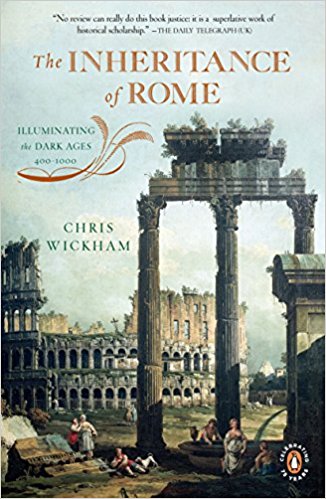|
The Inheritance of Rome: Illuminating the Dark Ages 400 - 1000
by Chris Wickham Published in August 2010 688 Pages Thibault’s Score: 3/5 Chris Wickham wrote “The Inheritance of Rome” to create a broad historical overview of the history of Europe and the Mediterranean during the years 400 AD - 1000 AD. As Wickham points out in the first chapter, due to the lack of sources and lack of modern scholarly interest, no other books surveying that period had been written in decades. The Inheritance of Rome is truly broad in scope. It covers everything from life in the late Roman Empire, to the barbarian invasions, to the rise of Islam, to Charlemagne, to the Vikings. Although I learned a lot from the book, and find the period being studied to be fascinating, I don’t recommend it to anyone who isn’t deeply curious about the period. I found the work to be both too general and broad in scope, but also too specifically focused on addressing the critiques of other modern scholars. Wickham spends a lot of time refuting grand historical theories that I haven’t heard of. For example, he devotes a lot of ink to refuting the notion that the barbarians completely rewrote and “Germanized” Europe. I would have preferred if he would have spent less time refuting other scholars and theories, and more time expanding his own. The book is incredibly long, as any book covering this period should be. It got quite dull at times, and I found myself frequently lost in the endless tangles of faceless Medieval kings and bishops. This book also does a great job at covering time periods that are extremely obscure. For example, I enjoyed reading about the rise of Charlemagne. Wickham makes it very clear that Charlemagne was not unique, and was walking in the footsteps of the reformers and conquerers that preceded him. My most important takeaway from this book is that the series of events that has been labeled as “the fall of the Roman Empire” wasn’t really a fall. There was no clear breaking point with the past. Instead, Roman society slowly evolved into Medieval Europe, and the people living at the time had no conception or realization that the Roman Empire had fallen until Charlemagne attempted to artificially revive the empire. Overall, I don’t recommend this book to anyone who isn’t specifically a scholar of the period being studied. Combined with my prior knowledge of the period, I enjoyed Wickham’s attention to following the continuity of institutions across the ages. Few books that I have reviewed can so easily be classified as a “3/5,” falling right in the middle of the pack.
0 Comments
Leave a Reply. |
Thibault SerletMost of my articles are book reviews, but I also write about many other topics. Archives
December 2023
Categories |

 RSS Feed
RSS Feed